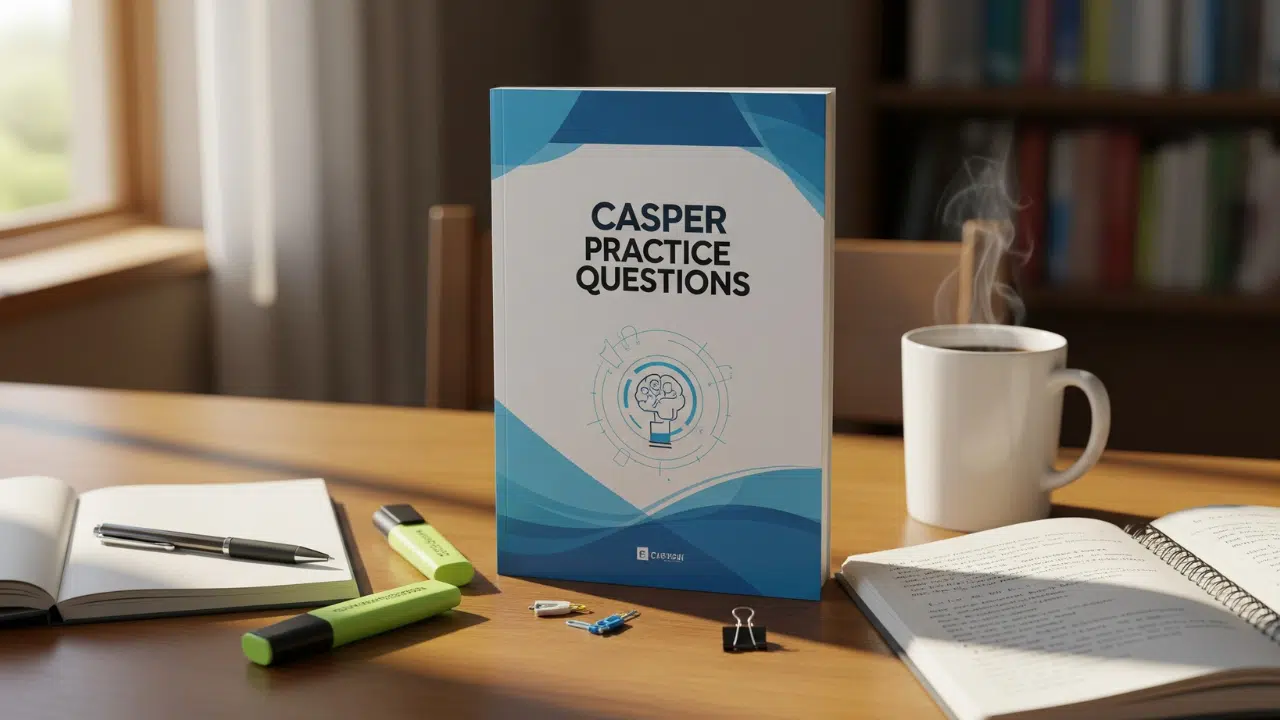Are you feeling unsure about how to prepare for the Casper test? You’re not alone, and you’ve come to the right place.
Whether this is your first time hearing about it or you’ve already started your Casper test prep, this guide will walk you through everything you need to feel ready.
We will see real Casper practice questions, share easy tips, and even help you build your own Casper practice test at home.
With the right practice and mindset, you’ll be ready to handle whatever comes your way.
Let’s get started!
What is the Casper Test?
The Casper test is an online test used by many schools, especially for medical and healthcare programs.
It checks how you think, act, and make decisions in real-life situations. It doesn’t test your math or science skills. Instead, it looks at things like:
- How kind and fair you are.
- How well you work with others.
- How do you handle problems
The test includes two types of questions:
- Typed responses: You read a situation and type your answer.
- Video responses: You watch a short video and record your answer out loud.
Why Casper Practice Questions are Important
Doing well on the Casper test is all about how you respond to different situations. That’s why practising with real examples is so helpful. It helps you:
- Understand the types of questions you’ll see.
- Learn how to answer quickly and clearly.
- Feel less nervous on test day.
Using a Casper practice test lets you prepare like it’s the real thing.
Types of Questions on the Casper Test
To prepare well, you first need to understand what the test looks like. Here’s a breakdown of the different types of questions you’ll face on the Casper test.
| Question Type | What You’ll Do |
|---|---|
| Typed Response | Read a short story and type your answers to 2–3 questions. |
| Video Response | Watch a short video and record yourself answering out loud. |
You’ll get a total of 15 scenarios on the test:
- 9 typed sections
- 6 video response sections
Each question will ask you to think quickly and respond clearly.
There are no right or wrong answers, just be honest, kind, and thoughtful.
Understanding these question types will help guide your Casper test prep and make your Casper practice questions more effective.
Casper Practice Questions (With Sample Answers)

Word-Based (Typed) Scenario #1
Prompt:
Your coworker takes credit for a group project you helped complete. Your manager praises them, but not you.
Questions:
- How would you respond to this situation?
- Would you talk to your manager? Why or why not?
- What can be done to prevent this from happening again?
Sample Answer:
I would first talk to my coworker privately to understand what happened. If it seemed unfair, I’d calmly speak with my manager and explain how I helped. I think it’s important to be honest and respectful. For the future, I’d ask that group work be clearly divided and shared with the team.
Video-Based (Spoken) Scenario #1
Prompt:
A customer is upset in a store because the item they want is sold out. They are yelling at your coworker.
Questions:
- What would you do in this moment?
- How would you help your coworker?
- How can this be handled better next time?
Sample Answer:
I’d stay calm and speak to the customer kindly. I’d let them know I understand they’re upset and try to offer help, like checking other stores or offering similar items. I’d also support my coworker by being present and helping them stay calm, too.
Word-Based (Typed) Scenario #2
Prompt:
Your friend tells you they are thinking of dropping out of school because they feel overwhelmed.
Questions:
- What would you say to your friend?
- What are some ways to help them feel supported?
- Who else might be able to help?
Sample Answer:
I’d listen and let them know I care. I’d tell them they’re not alone and suggest talking to a counselor or trusted teacher. I’d also offer to help with studying or just be there for them to talk to.
To boost your preparation with some more questions, here are some websites to which you can refer:
Common Question Types & Preparation Strategies
| Question Style | Example Scenario (Paraphrased) | What to Focus On |
|---|---|---|
| Ethical Dilemma | Difficult coworker, possible discrimination, reporting mistakes | Multiple perspectives, fairness |
| Personal Reflection | Supporting friends, making tough decisions | Self-awareness, growth |
| Professionalism | Copying at work, reporting to colleagues | Integrity, honesty |
| Difficult Conversations | Confronting managers, challenging authority | Communication, diplomacy |
| Judgment | Unethical business behavior, observing misconduct | Action, reasoning, outcomes |
Tips to Ace the Casper Test
Here are some simple but powerful tips to help you feel confident and ready. These will make your Casper test prep smoother and your answers stronger.
- Be Yourself: Real, honest answers make a better impression.
- Practice with a Timer: Helps you get used to thinking and responding quickly.
- Use the STAR Method: Keeps your answers clear and organized.
- Show Empathy and Respect: Casper looks for kindness and understanding.
- Stay Calm and Think First: Clear thinking leads to better answers.
- Reflect on Your Practice: Helps you improve with each try.
The Bottom Line
The Casper test may seem tricky at first, but with the right Casper practice questions and smart Casper test prep, you can do really well.
Remember, the test isn’t about being perfect. It’s about showing who you are kind, honest, thoughtful, and calm under pressure.
Use the tips, practice questions, and full Casper practice tests in this blog to help you prepare.
The more you practice, the more confident you’ll feel.
Take your time, believe in yourself, and let your true personality shine through in every answer.
Frequently Asked Questions
Can I Retake the Casper Test?
Usually, no. Most schools allow only one test per application cycle.
How Long is the Casper Test?
It takes about 90 to 110 minutes, including breaks between sections.
Do I Need Special Software for the Casper Test?
You’ll need a working webcam, microphone, and a quiet space. No special downloads, just a browser.












